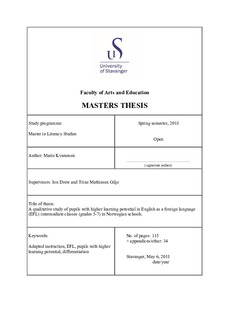A qualitative study of pupils with higher learning potential in English as a foreign language (EFL) intermediate classes (grades 5-7) in Norwegian schools.
Master thesis
Permanent lenke
http://hdl.handle.net/11250/2504328Utgivelsesdato
2018-05-10Metadata
Vis full innførselSamlinger
- Student papers (HF-IKS) [903]
Sammendrag
This thesis has aimed at researching pupils with higher learning potential in English as a foreign language (EFL) intermediate classes (grades 5 to 7) in Norwegian schools. Since 2015, the term higher learning potential (hereafter also HLP) has been employed to the group of pupils who are “high achieving, demonstrate specific talents or have the potential to achieve on the highest levels in one or more subjects” (Norwegian Directorate for Education and Training, 2016). The study was concerned with how pupils with HLP in Norwegian EFL intermediate classes (5-7) were accommodated for by their teachers, namely if and how their teachers adjusted their teaching for this group of pupils, and how their pupils experienced the EFL teaching. The study was qualitative and the data was obtained from semi-structured interviews with four EFL teachers from different primary schools and three to four high achieving pupils in each of their classes. One of the schools was targeted through the researcher’s knowledge about this school’s awareness of pupils with HLP. The pupils, 13 in total, were interviewed in four group interviews. In addition, the pupils’ parents were interviewed through an online interview.
The study showed that although all the teachers acknowledged that their pupils with HLP needed adapted instruction, they varied in the degree to which they adapted their instruction to accommodate for them. The teachers expressed that factors such as lack of focus on these pupils from the administration, being alone with large classes, lack of teaching resources, and lack of opportunities to reflect on practices with colleagues, made the EFL adaption task difficult and challenging. The study showed that the majority of the pupils were mostly challenged in terms of more of the same work to do, and not in qualitatively different work. Several of the pupils had refrained from asking for more challenges because it resulted in more of the same work. The study also revealed that although the pupils were generally very motivated to engage with the English language outside of school, the majority of them perceived their EFL classes as little relevant, meaningful, or motivating.
The study revealed that the majority of the pupils did not explicitly know how to develop their English skills. Several of the pupils therefore, sometimes together with their parents, had to take intuitive steps to continue their L2 development. However, because some of the parents were not aware of their children’s high level of English skills, and did not engage in their homework, the study revealed that some of the pupils were at risk of not being given support in their L2 development by either their teacher or their parents.
The main contribution of this thesis is that there has been little, if any, previous Norwegian research specifically targeting pupils with higher learning potential in Norwegian EFL classrooms. By including the pupils’ voices in this study, in addition to that of the teachers and parents, the thesis has contributed by giving insight into these pupils’ life worlds in EFL classes. Teachers and administrators may in future be better prepared to address the needs of the pupils in focus if the phenomenon of pupils with HLP is better understood, as this thesis has aimed to do. By including a target school in this study, the thesis has also provided insight into possible “best practices” that may be used to model the teaching of pupils with HLP in Norwegian EFL classes.
Beskrivelse
Master's thesis in Literacy studies
